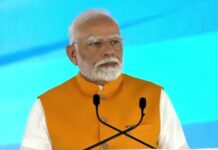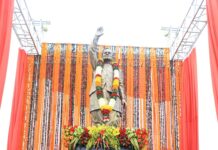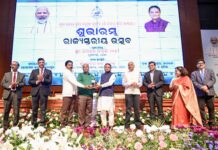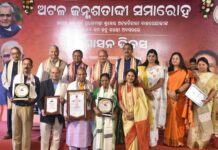By Dr Bhabani Shankar Nayak
LONDON: “Here richly, with ridiculous display,The Politician’s corpse was laid away.While all of his acquaintance sneered and slangedI wept: for I had longed to see him hanged.Another on the Same”― Hilaire Belloc.
The 20th-century conservative French and English poet Hilaire Belloc did not write this poem, ‘Epitaph on the Politician Himself’, to pen the political obituary for the long-serving outgoing Chief Minister of Odisha, Mr. Naveen Patnaik. However, each word of the poem aptly resonates with the political and electoral transformation in Odisha. Ordinary people push all-powerful to the dustbin of history and make them irrelevant in public life while exercising their democratic dissent in the form of voting during elections.
No one is studying Odisha politics immediately after the recent electoral defeat of Mr Naveen Patnaik led Biju Janata Dal (BJD) which has governed the state for more than two decades. The 4th of June election result has already written the political epitaph of many BJD leadership including its founder Mr Patnaik. It is an ignominious end of long-standing political dominance of BJD and its future in the state. It has effectively become irrelevant in national politics with no seats in the Lok Sabha.
This electoral defeat and dissatisfaction of Odia people and their discontent was directed not just at the party, but personally at Mr. Patnaik, who had been a central figure in Odisha politics for decades. His was defeated in the Kantabanji assembly seat and his vote share has declined in Hinjili where he won with a smaller margin of votes than the previous state election. Mr. Patnaik has squandered the political goodwill of the working masses in the state. His political demise is a product of his own making. Mr. Patnaik’s political demise and his precarious political future can be attributed to several factors.
Mr Patnaik’s resigned state of leadership with the withdrawn mindset, over dependence on ignorant and arrogant bureaucrats, technocratic political interventions, over engagement with religion, imposition of unpopular leadership on the party and the state, and disengagement with working masses, failure to deliver development, employment, livelihoods, and empowered citizenship to people etc have alienated many within his party and among Odia voters as well. Additionally, there were growing concerns over corruption, lack of development in key areas of health, education agriculture, and a failure to address the needs and aspirations of the younger generation. These issues cumulatively eroded the trust and support that the BJD once enjoyed. Furthermore, the opposition parties like BJP capitalised on these weaknesses, mounting a more effective campaign that resonated with the public’s desire for change.
The defeat of the Biju Janata Dal (BJD), therefore, is not merely a reflection of Mr. Patnaik’s political missteps but also a testament to the evolving political sentiments in Odisha, where people have rejected imposed leadership of an unelected bureaucrat. Voters in the state are increasingly demanding accountability and progressive governance—qualities that the Hindutva politics is unlikely to provide. This shift in voter sentiment highlights a broader trend where citizens are prioritising effective leadership and tangible improvements in their quality of life over the ideological agendas pursued by Hindutva politics.
Mr. Patnaik has played a significant role in the rejuvenation of Hindutva politics in the state. His alliance government with the BJP marked the initial step in Hindutva politics’ quest to capture state power in Odisha. The BJP, acting as a secondary partner to Mr. Patnaik’s BJD, failed to deliver meaningful results for the people of the state while serving in the opposition. Moreover, under Mr. Patnaik’s leadership, the BJD has consistently supported BJP policies and bills in the Indian parliament, blurring the lines between the two parties in terms of governance. As a result, there has been very little distinction between the BJD and the BJP in their approach to governing Odisha in terms of economic policies for development. Both panders to primitive crony capitalists who plunder the natural resources in the state.
In the coming months, it will be crucial to monitor how the BJD attempts to regroup and rebuild itself as a political entity, and whether Mr. Patnaik will play any role in this process. Equally important will be the actions and policies of the new government led by the BJP, as they will set the course for Odisha’s future development and political stability as per the Hindutva requirements.
Interreligious and intercultural harmony is the hallmark of Odisha. It is the duty of all to protect it from Hindutva onslaught. There is no place for the Hindutva culture of religious violence in the state. The people of Odisha must remain vigilant about the divisive policies and politics of Hindutva forces, ensuring that the state and its government work for the peace and prosperity of all its residents without any form of discrimination.
As Odisha moves forward, political parties will need to adapt to these changing expectations. They must focus on addressing the real issues facing the populace, such as economic development, education, employment, healthcare, and infrastructure, rather than relying on divisive or outdated rhetoric of Hindutva politics. The recent electoral outcomes suggest that only those who can genuinely respond to the needs and aspirations of the people will find lasting success.
The fall of BJD and rise of Hindutva politics led by BJP also offers alternative experiments in Odisha, where all progressive, left, democratic, liberal and secular forces can consolidate to create a political movement for the progressive, peaceful and prosperous future of Odia people and their planet.
(The writer Dr Bhabani Shankar Nayak, hails from Eastern Indian State of Odisha, Presently Teaches at University of Glasgow, London, UK and has 2 Decades of Teaching Experience in British Universities. Views Expressed are Personal).



























